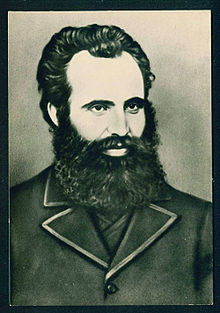Lyuben Karavelov
Lyuben Stojtschew Karawelow ( Bulgarian Любен Стойчев Каравелов ; born November 7, 1834 in Kopriwschtiza , † January 21, 1879 in Russe ) was a Bulgarian poet, activist of the Bulgarian National Revival and brother of the Bulgarian politician Petko Karawelow . He played a crucial role in founding the Bulgarian Revolutionary Central Committee ( BRZK ), a national revolutionary movement modeled on the Inner Revolutionary Organization .
Life
He was born in 1834 to a wealthy family in Koprivshtitsa , first attended school there, then in Plovdiv , and then studied in Russia . During his ten-year stay there, he made many useful contacts. He was influenced by the ideas of the Russian revolutionaries and democrats Chernyshevsky , Dobroljubow and Herzen , and worked for newspapers such as "Den", "Moskva", "Golos" and the like. a.
In 1867 Karavelov was sent to Belgrade as a correspondent for "Golos". In Serbia he made contact with the Serbian liberal organization "Omladina" and organized a Bulgarian committee that was supposed to send revolutionary groups to the Bulgarian territories. After the murder of the Serbian King Mihailo Obrenović , Karawelow was thrown into prison in Budapest in 1868 , where he reconsidered his previous experiences and ideas over the course of the 203 days of his stay. In his address to the Bulgarians, published in 1869 under the title “My Brothers”, he developed the idea that the Bulgarians themselves should fight for their freedom by fighting the Greek clergy and Turkish conquerors. In a further step, he proposed cooperation with the Serbs against the common enemy.
In the autumn of 1869 Karawelow came to Bucharest, where he published his newspaper "Swoboda" (Freedom) (until 1872). Revolutionary emigrants, participants in former liberal and revolutionary organizations, gathered around the newspaper office. Some of them founded a new movement in 1869 - the Bulgarian Revolutionary Central Committee. In Karawelov's opinion, this should pursue the goal of removing the Turkish administration in the Bulgarian territories and establishing a separate state. In his opinion, this should be done with the help of great powers such as Russia. He was critical of the mostly wealthy Bulgarians who sympathized with the Turks.
At the same time, another revolutionary organization existed in the Bulgarian territories under the leadership of Vasil Levski : the Internal Revolutionary Organization . Both organizations had the same goal - the liberation of Bulgaria from the Turks - but different ideas about how this should be achieved. However, its members gradually realized that they depend on mutual cooperation.
The first joint meeting took place from April 29 to May 5, 1872 in Bucharest . It was agreed to integrate the Internal Revolutionary Organization into the Bulgarian Revolutionary Central Committee, whereby it received the majority of votes, namely 33 to 17 for the emigrants. A joint program was decided.
After his return to Bulgaria Levski began to reorganize the revolutionary network. One of his helpers was Dimitar Obschti , a revolutionary with great experience but stubborn and undisciplined. Unbeknownst to Levski, he organized an attack on the Turkish post office in the Arabakonak mountain pass on September 22, 1872. Faced with the danger that the revolutionary organization would be destroyed in the subsequent arrests and that its members would be discovered and killed, Levski received a letter from Karavelov in which he was asked to act immediately. He went to Bucharest to discuss the whole situation. On the way he was betrayed, arrested by the Turks and hanged a little later (February 6, 1873). After disagreements about how to proceed within the Revolutionary Committee, Karawelow withdrew from the committee in 1874. From 1875 to 1876 he published the biweekly magazine for science and literature "Wissen" and devoted himself entirely to the editorial work for his magazine "Znanie". Although he leaves the organization he founded at a critical moment, Karavelov remains an important ideologist and organizer of the Bulgarian Liberation Movement.
Web links
- Literature by and about Lyuben Karawelow in the catalog of the German National Library
- http://www.mfa.government.bg/history_of_bulgaria/81.html
- http://slovo.bg/old/karavelov/
| personal data | |
|---|---|
| SURNAME | Karavelov, Lyuben |
| ALTERNATIVE NAMES | Karavelov, Lyuben Stojchev; Каравелов, Любен Стойчев (Bulgarian) |
| BRIEF DESCRIPTION | Bulgarian poet and brother of the Bulgarian politician Petko Karawelow |
| DATE OF BIRTH | November 7, 1834 |
| PLACE OF BIRTH | Koprivshtitsa |
| DATE OF DEATH | January 21, 1879 |
| Place of death | Russian |
